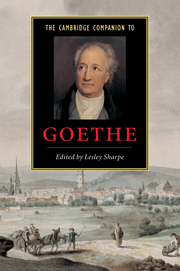Book contents
- Frontmatter
- Introduction
- 1 The world Goethe lived in
- 2 Goethe the writer and literary history
- 3 Goethe the poet
- 4 Goethe the dramatist
- 5 Faust
- 6 Weimar Classicism
- 7 Goethe and the Weimar theatre
- 8 Goethe’s prose fiction
- 9 Autobiographical writings
- 10 In defence of experience
- 11 Goethe and gender
- 12 Goethe and the visual arts
- 13 Goethe and the political world
- 14 Religion and philosophy
- 15 Reception in Germany and abroad
- A guide to further reading
- Index
15 - Reception in Germany and abroad
Published online by Cambridge University Press: 28 May 2006
- Frontmatter
- Introduction
- 1 The world Goethe lived in
- 2 Goethe the writer and literary history
- 3 Goethe the poet
- 4 Goethe the dramatist
- 5 Faust
- 6 Weimar Classicism
- 7 Goethe and the Weimar theatre
- 8 Goethe’s prose fiction
- 9 Autobiographical writings
- 10 In defence of experience
- 11 Goethe and gender
- 12 Goethe and the visual arts
- 13 Goethe and the political world
- 14 Religion and philosophy
- 15 Reception in Germany and abroad
- A guide to further reading
- Index
Summary
For much of his adult life, Goethe had a dominant position in the Republic of Letters in Germany as well as abroad. No one who amounted to anything, whether it was Kleist or Heine, Scott or Byron, Musset or Saint-Beuve, Mazzini or Pushkin, could possibly bypass him and his work. Admirers and opponents alike would agree on one point: 'He disposes of the poetic world, like a conqueror of the real earth.' Confronted with his monumental stature and output, they took a position either in favour of Goethe or against him, sometimes even switching sides in the course of their careers. As a result, Goethe became a controversial figure both for poets and critics, for Germans as well as for Europeans. But what has been his enduring impact?
By the end of his life, Goethe felt less accepted by German than by European contemporaries, who between 1827 and 1831 not only sent him birthday gifts (medallions and books) from Paris, Moscow, and Scotland (Carlyle in 1831), but also published three reviews of his ‘Helena’ tragedy (Faust II, Act iii) in the same year (The Foreign Review, Edinburgh; Le Globe, Paris; The Moscow Messenger, 1828). Goethe was delighted, since this lively response seemed to confirm his venture to promote Weltliteratur (world literature) as a network of communication among intellectuals and peoples across national frontiers. For him Weltliteratur was neither the sum of all national literatures nor the ever increasing canon of world masterpieces, rather he conceived of it as a dynamic process of rapprochement among European nations – above all Britain, France and Germany – with the goal of breaking down the walls of national prejudices that hampered peaceful coexistence in the wake of the Napoleonic Wars.
- Type
- Chapter
- Information
- The Cambridge Companion to Goethe , pp. 232 - 255Publisher: Cambridge University PressPrint publication year: 2002
- 5
- Cited by



